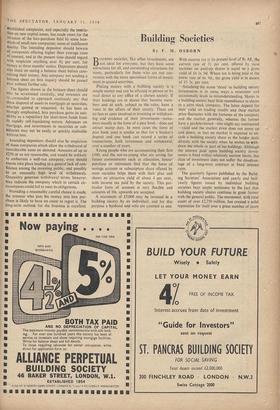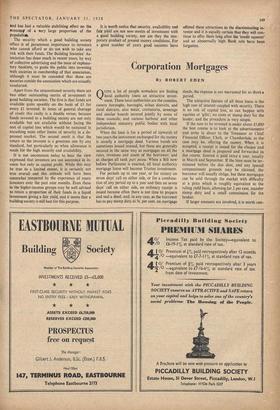Building Societies
By F. M. OSBORN
BUILDING societies, like other investments, are not ideal for everyone; but they have some attractions for all, and outstanding attractions for many, particularly for those who are not con- versant with the more specialised forms of invest- ment in quoted securities.
Placing money with a building society is a simple matter and can be effected in person or by mail direct to any office of a chosen society. If their holdings are in shares they become mem- bers and as such, subject to the rules, have a voice in the affairs of their society. There are no fees or costs involved in investing or withdraw- ing and evidence of their investments—nowa- days usually in the form of a pass book—does not attract stamp duty. In most cases the form of pass book used is similar to that for a banker's deposit and one book can record a series of transactions, both investment and withdrawal, over a number of years.
Young people who are accumulating their first £100, and the not-so-young who are saving for future commitments such as education, house- purchase or retirement find that the form of savings account or subscription share offered by most societies helps them with their plan and shows an attractive yield of about 4 per cent., with income tax paid by the society. This par- ticular form of account is very flexible and amounts of 10s. upwards are accepted.
A maximum of £5,000 may be invested in a building society by an individual, and for this purpose a husband and wife are counted as one.
With income tax at its present level of Rs. 6d., the current rate of 31 per cent. offered by most societies on paid-up shares is equal to a gross yield of £6 Is. 9d. Where tax is being paid at the lower rate of 6s. 9d., the gross yield is in excess of £5 5s. per cent.
' Attaching the name 'share' to building society investments is in some ways a misnomer and occasionally leads to misunderstanding. Shares in a building society bear little resemblance to shares in a joint stock company. The latter depend for their yield on trading resultS and their market price fluctuates with the fortunes of the company and the market generally, whereas the former have a predetermined—one might say contractual —yield and the market price does not move up and down; in fact no market is required to en- cash a building society share as the holder deals directly with the society when he wishes to with- draw the whole or part of his holdings. Although the interest paid upon building society invest- ments is fixed within relatively narrow limits, this class of investment does not suffer the disadvan- tage of a long-term contract at fixed interest rates.
• The quarterly figures published by the Build- ing Societies' Association and yearly and half- yearly figures issued by individual building societies bear ample testimony to the fact that building society shares continue in great favour with the general public. The movement, with total assets of over £2,250 million, has created a solid reputation for itself over a great number of years and has had a valuable stabilising effect on the economf of a very large proportion of the populatioa,
The security which a good building society offers is of paramount importance to investors who cannot afford or do -not wish to take any risk with their funds. The Building Societies' As- sociation has done much in recent years, by way of collective advertising and the issue of explana- tory booklets, to guide the public into investing with societies in membership of that association, although it must be conceded that there are societies outside the association which are soundly conducted.
Apart from the unquestioned security there are two other outstanding merits of investment in good building societies. The first is that funds are available quite speedily on the basis of £1 for every £1 invested. In times of general shortage of credit this really is a double virtue, because funds invested in a building society are not only available but are available without facing the sort of capital loss which would be sustained in encashing most other forms of security in a de- pressed market. The second merit is that the return to the investor is a generous one by any standard, . but particularly so when allowance is made for the high security and availability.
It is not uncommon today to hear the view expressed that investors are not interested in in- come but only in capital profit. While this may be true to a limited extent, it is certainly not true overall and this attitude will have been somewhat tempered by the experience of many investors over the past nine months. Even those in the higher-income groups may be well advised to retain a proportion of their funds in a liquid Investment giving a fair yield, and it seems that a building society is still best for this purpose. It is worth notice that security, availability and fair yield are not new merits of investment with a good building society, nor are they the tem- porary product of present money conditions. For a great number of years good societies have offered these attractions to the discriminating in- vestor and it is equally certain that they will con- tinue to offer them long after the 'credit squeeze' and an abnormally high Bank rate have been forgotten.







































 Previous page
Previous page